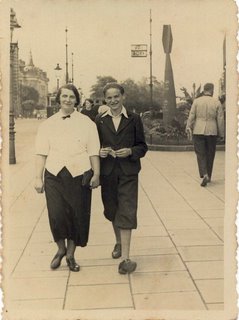Erich Meissner Part I: Siberia

Erich and his parents were separated from the two older brothers and forced to flee north when the Germans marched into Czechoslovakia. They did not have a particular destination in mind--only the goal to get as far away from the Germans as possible. Here is a piece of Erich's oral history describing some of his experiences in Siberia . All questions in parentheses (...) are mine.
(How were the conditions on these boats, on these trains taking you north?)
You can imagine. It was quite crowded. (laughs) But we received food.
(How did your parents react to all of this? Were they—I mean, there was nothing you could do, but were they panicking, calm?)
No, no, they were not panicking. That was the destination. We didn’t know what was going to happen.
(So you get to this—?)
Well, we got to our final destination. It was a gold mine. The place was called Minor. M-i-n-o-r. When we arrived it was September. It was already snowing.
(Was it a camp?)
It was not really, it was a a special camp, let’s say. But it was vacated from the local people. Our transport was about four hundred or five hundred people when we came to this place. It was wintertime. The gold mine was not a deep mine, but it was on the surface. That means during wintertime it was not working. It was working only in summertime. Summertime means from May till end of August.
(So you arrive in September, so it’s—?)
OK. So I started to work in the woods cutting trees.
(Hard labor.)
Yes.
(Was your father working with you? )
No. Father couldn’t work, and Mother wasn’t either working. The only breadwinner was me at that time.
(Were you living in your own house?)
We were living in a house, a wooden house, one big room. We were—how many families? one, two—about four or five families. In the middle of this room was a stove, with a chimney, that was standing on the bare earth. That was the main thing. So when we were cooking, everybody had his small place (laughs) around the stove. It was quite a difficult situation, but you know....we managed.
(What were the other families like?)
The other families were the like us. Our family was four persons, because in the meantime we found a brother of my mother who was also deported from Katowicz. You heard about Katowicz? It’s not very far from Breslau, where your grandfather came. He [the uncle] was deported and we found him in Lemberg on the way to Siberia, so we took him with us. So we were four: my uncle, my father, my mother, and me.
(Did you know anything about your brothers? Did you know where they were?)
No.
No contact at all. That would not happen until a few years later.
(And tell me, did you become friends with any of the other families?)
Sure, sure. As usual.
(Were they also from the same area?)
They were from Poland. Almost the whole transport were Jews from Poland. There were about two or three non-Jewish families in the whole transport. Besides that there were only Jewish refugees from different parts of Poland.
(So you were in Siberia working.)
Yes.
(What about the winter? Did you work all winter?)
Yes, of course. During the wintertime different things, and during the summertime I worked in the gold mine with a—how do you call it, wheel cart?
(Wheelbarrow.)
Yes. They were putting earth in the wheelbarrow, and it went on a transport band up and then it was washed by water. You know gold is heavy, so it was sitting on a screen, a metal screen. It’s a heavy metal, of course.
(That was 1940?)
That was 1940, ’41, that was already—the first winter was 1940 and then was 1941, summertime. In the meantime, the German-Russian war started, so we received amnestia, amnesty. We were no longer prisoners. We were "free." They told us, “You can go wherever you want.” That was 1941. We were sitting in the same place till summer 1942. Summer 1942 we started to go a back towards home. So how did we manage that? We have had to build boats. There were Russians, they were building boats. And they were going—they were guiding us the stream downward.
(One quick thing before we move forward: in this camp—not camp, but where you lived, settlement—were there guards, were there soldiers everywhere?)
We have had—our boss was in KPD, from the secret police somebody. In the beginning we have a few guards, three, four guards. I don’t remember how many there were. But it was not necessary. It was nowhere. It was in the taiga. You could not go to any place. But the boss was a nice guy.
(He was OK.)
He was very OK.
(So you start going—?)
OK, so we started going back towards home.
The last vessel of the summer season left just as we arrived. So we didn’t get it. (chuckles) We had to stay at this place for the entire winter. That was ’42, winter ’42-’43. In summertime ’43, there was an organized retreat and we went to Yakutsk. So we arrived to Yakutsk in 1943 and we stayed there for the winter. In 1944, there was already an organized transport from our original transport, we were already altogether, more or less, and we were shipped to the European part of the Soviet Union. The Poles went to towards Warsaw, I think. We were Czech citizens, so we went towards what used to be our home...
Transcription by Sandy Adler, Adler Enterprises LLC
Photo: From Meissner family collection. Erich and mother Lotte (Charlotte) Meissner before World War II.

0 Comments:
Post a Comment
<< Home